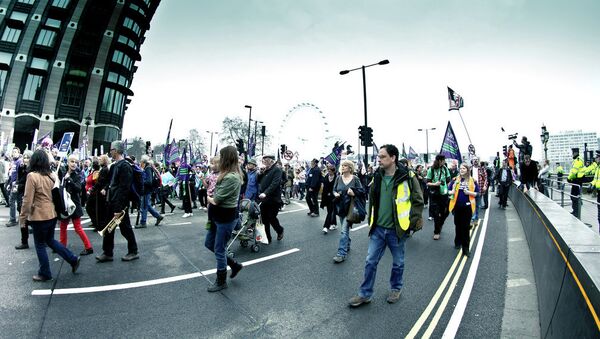Labour, on the other hand, say too many jobs are part-time.
Official figures from the Office for National Statistics show that from December 2014 to February 2015, 73 percent of people in Britain aged 16 to 64 were employed. That's over 30 million people.
Employment rates, work & jobs are dominating the run up to #ge2015 — @jrfAleks has the facts: http://t.co/yxmar4AZAQ pic.twitter.com/dzMTaBUp39
— Joseph Rowntree Fdn. (@jrf_uk) April 30, 2015
The unemployed — or according to the ONS those 'seeking work', stand at 1.84 million in Britain, falling by 76 thousand from December to February.
The number of people claiming Job Seeker's Allowance fell by 21 thousand to 77 thousand.
#Employment rate 73.4% for Dec-Feb 2015, highest figure on record http://t.co/YEbi05OVFD pic.twitter.com/yPMPTz74La
— ONS (@ONS) April 17, 2015
There was an increase in employment and a fall in unemployment, when comparing the three months ending February 2015 with September to November 2014.
Meanwhile, underemployment and part time work figures for the European Union and published by Eurostat reveal that the UK has the largest proportion of people in the EU who want to — and can — work more hours.
UK had 2nd lowest EU unemployment rate in latest data (though quality of jobs also an election issue): pic.twitter.com/FFHsVrUO49
— Douglas Fraser (@BBCDouglasF) April 30, 2015
Just over 1.8 million people in the UK aged between 15 and 74 are "working part-time and [are] unemployed". Germany follows with a little over 1.6 million, followed by Spain with 1.57 million, and France with 1.56 million.
But the Conservative party mantra, in the run up to the general election, states: "The Conservatives are helping create jobs so hardworking people can get on in life.
"By backing small businesses and enterprise, we have helped create 1.9 million new jobs — that's more people taking home a pay packet each month and being able to provide for their families."
Recent analysis by the Institute for Fiscal Studies (IFS) of the tax and benefit proposals by the main parties, warns that Conservative proposals "would almost certainly require significant cuts to some of the main benefits — child benefits, housing benefits, tax credits and disability benefits."
Zero-hours contracts just the tip of the iceberg for low-paid and insecure jobs, says the TUC http://t.co/37GaUYt54t
— TUC Media Team (@TUCnews) April 27, 2015
A 22 year old man working full time in London told Sputnik News that coming off benefits in the last year was what he always wanted to do — but working full time and having to meet the full cost of his rent and council tax leaves him with little to survive on each week.
"If I'm off sick for a day — I don't get paid. This week I had to pay my mobile phone bill which means I have no money to put on my gas and electricity meter. I'm broke."
"I have to push the emergency credit button, which gives me £6.00 worth of electricity and £5.00 worth of gas. That's just enough to have hot water to wash my face and keep my electric radiator going," he said.
"Getting by is the reality and only being able to afford to eat once a day is normal."
The IFS report suggests that the pace of cuts in line with Conservative proposals would be faster than in the last government and would hit the poorest households hardest. According to the analysis by the IFS, people on higher incomes of around £150,000 would benefit the most from Conservative proposals.
UK near bottom of EU league for underemployment http://t.co/MPoTyVmvlk
— TUC Media Team (@TUCnews) April 27, 2015
Responding to the report, TUC General Secretary Frances O'Grady said: "The IFS report shows that the Conservatives will cut taxes for the better off, and fund it with cuts to benefits and tax credits for the very hard-working families they claim to champion.
"With one in five earning less than the living wage, millions of working people depend on a proper welfare safety net to make ends meet. This is not dealing with abuse, it's ripping the heart out of a welfare safety net that any us of might need."
In the UK, people earning a low wage or receiving Job Seeker's Allowance are eligible for housing benefits from the local authority to help with rent. As the wage increases, the benefits decrease until they stop altogether.
Sounds simple — but factor in council tax, electricity, gas and food, and the stark reality is that some people in Britain are too poor to eat properly, or even heat their homes — despite going to work.



